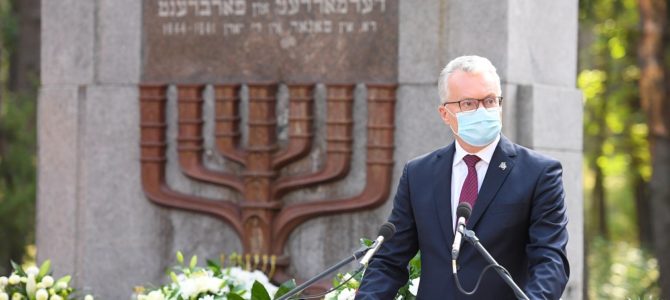Dear Holocaust survivors,
Ladies and gentlemen,
We are gathered here today to pay our respects to the hundreds of thousands of Lithuanian Jews who lost their lives in the Holocaust.
Shoah means catastrophe. But this is not just the tragedy and catastrophe of the Jewish people. The Shoah is Lithuania’s. This is the Shoah of all mankind. This is a Shoah of our humanity, compassion and ambivalence.
Here alone in Paneriai, we, the state of Lithuania, lost tens of thousands of our fellow citizens with whom we built the independent Lithuanian state together. Fighting together in the battles for independence, suffering together the young state’s most difficult years, together putting our hopes in the future of an independent Lithuania.
We lost talented scholars, artists, poets, doctors, businesspeople and artisans, teachers and clerics. Me lost elders who preserved the memory of hundreds of generations living together in friendship, and we lost the children who would have been this country’s future.
Here, in Paneriai, and throughout Lithuania, over the course of a few years we lost a large and very important part of ourselves. And today, sadly, we can only imagine what a creative, educated, industrious and smart Lithuania there would have been if not for the Catastrophe.
It is said there are six stages to understanding the grief of every loss: shock, denial, anger, bargaining, depression and finally acceptance and reconciliation.
Which stage are we at?
The only way to come to terms with history is to realize and tell ourselves the truth, no matter how painful if might be. For many years after the war, Lithuania wasn’t able to talk about the Catastrophe. Even after the fall of the Soviet Union, people found it difficult to discuss the Shoah and to understand how this kind of tragedy could have happened.
We denied it, we got angry, we tried to bargain with our conscience, calculating and comparing that which cannot be calculated nor compared, human suffering, human lives. It was difficult for us to admit to ourselves that our country’s citizens died at the hands of Lithuanians as well.
We found in ourselves the power, however, to look history in the face; in 1995 the first president of the independent Republic of Lithuania travelled to Israel and asked forgiveness for the Lithuanians who contributed to the Holocaust.
I really want to believe today we have reached the stage of accepting and understanding our loss.
This cannot be reconciliation–no one will ever reconcile themselves to the Holocaust. No one will ever revive the innocent victims, either. And no one will ever ease the suffering of those who here in Paneriai and at many locations throughout Europe lost their families, their friends, the people they loved. They say time heals all wounds, but this great loss will take hundreds and perhaps thousands of years to heal.
But it is only by understanding the scale of the tragedy, by comprehending the facts and responsibility, that we can begin to talk about the future.
When Holocaust survivor Elie Wiesel delivered his speech upon receiving the Nobel prize, looking back over the 20th century, he didn’t talk about the bloody events, about Auschwitz and Buchenwald where he lost his family.
He spoke about ambivalence. The indifference which led the world to this tragedy and these horrors, to genocide, to the Holocaust. The lack of caring and compassion which kept us from reaching out to help those who were suffering and dying.
I am proud that almost one thousand Lithuanians risked life to help their neighbors, and have been recognized as Righteous Gentiles. I am filled with regret there were too few Righteous Gentiles to put a stop to this inhuman barbarity.
The route thousands of Lithuanian citizens were marched from the Vilnius ghetto to Paneriai was one way, from hell to death.
But standing here today at this Holocaust memorial we see life. We see the future.
A future where all the ethnic communities living together in Lithuania, shoulder-to-shoulder, are building the independent Lithuanian state. A strong, just, educated, democratic state which defends human rights, where there is no place for pervasive indifference.
Building this future is our task and our obligation to the victims of the Shoah.
The ray of hope is brightest in pitch blackness. So, standing here, in Paneriai, I would like to read an excerpt from a poem by Abraham Sutzkever, an inmate of the Vilnius ghetto, a writer who testified at the Nurember trials and a recipient of Lithuania’s Knight’s Cross of the Order of Gediminas:
Last hour, bring with you such nourishing belief
That in a single tear seven suns will be afire,
And in the resurrected dust, the seeds of heroes
Will germinate their will and terrible desire.
Thank you. A dank. Toda.
Full text in Lithuanian here.


